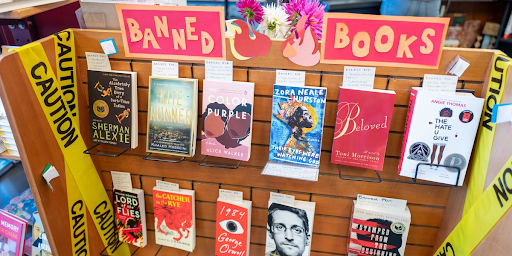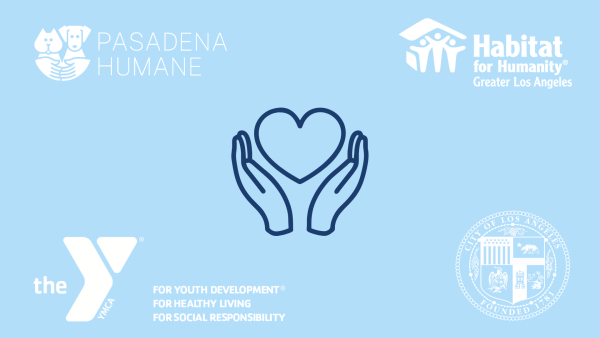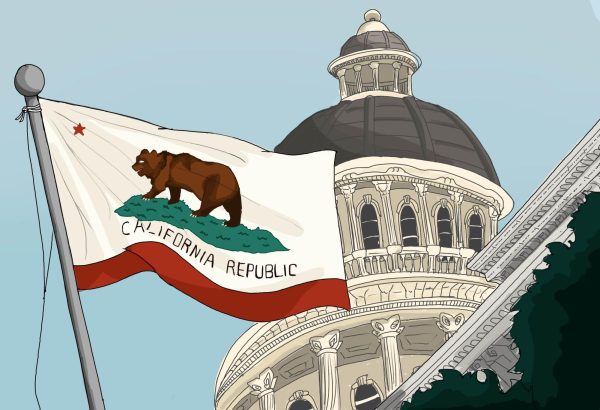“At What Point Do I Practice Subversion?”: States Are Afire With Wars Over Book Banning

Banned or censored books at Books Inc., an independent bookstore located in California. (Photo Credit: Vox)
In the fall of 2021, republican State Representative Matt Krause of Texas emailed the names of 850 books to superintendents, asking them if the listed works were on the library shelves of schools. Of the 850 books, most heavily focus on sexual identity, race, and gender. Works by Ta-Nehisi Coates, an American author and journalist who explores cultural, social, and political issues, and Margaret Atwood, whose work revolves around the themes of gender, identity, and climate change, among a handful of others, were included on the list. Though at the time Krause’s reason for his email was unknown, the following night at a school board meeting in San Antonio, Texas, parents blamed a librarian for “poisoning young minds.”
This school board meeting, however, was just the beginning of debates and battles on censorship and diversity in schools. Along with Texas, the diversity, equity, and inclusion efforts of other school districts across the United States have been reversed by right-wingers who believe the initiatives are critical race theory. Critical race theory is “a framework of legal and academic topics that examine social, cultural, and legal issues related to race and racism,” according to the National School Boards Association (NSBA). The uproar relating to book bans in schools begs the question, where will representatives draw the line between what books can and cannot be taught in schools?
Representatives Question the Morality of Books in Texas
“A growing number of parents of Texas students are becoming increasingly alarmed about some of the books and other content found in public school libraries that are extremely inappropriate in the public education system,” Governor Greg Abbott wrote in a letter to the executive director of the Texas Association of School Boards in November. “The most flagrant examples include clearly pornographic images and substance that have no place in the Texas public education system.”
Since the school board meeting in San Antonio, the evening after Representative Krause emailed a list of books to the superintendent, the curriculum of schools in Texas has also been questioned by other officials. Krause has asked schools to inform him on books that contain content from “Human sexuality, sexually transmitted diseases, or human immunodeficiency virus (HIV) or acquired immune deficiency syndrome (AIDS)” to “material that might make students feel discomfort, guilt, anguish, or any other form of psychological distress because of their race or sex or convey that a student, by virtue of their race or sex, is inherently racist, sexist, or oppressive, whether consciously or unconsciously.”
Along with Krause, Texas Representative Jeff Cason urged Texas’ attorney general to pay attention to “sexually explicit material in public schools.” Cason noted one book, in particular, Gender Queer: A Memoir, by Maia Kobabe, a nonbinary and queer author and illustrator. Kobabe’s book has been challenged and removed in other school districts across the country, as explained in a Washington Post op-ed. “A week later, I found out that ‘Gender Queer’ had also been banned in a school district in Florida, and within a month, it had been challenged at schools in Rhode Island, New Jersey, Ohio, Washington, and Texas, again,” Kobabe wrote.
Outside Texas, Similar Battles Take Place
Texas is not the only state with book banning at the center of debates. In Oklahoma, a bill was introduced that would prevent public school libraries from having books in libraries that relate to sexual activity, sexual identity, or gender identity.
Senator Rob Standridge of Oklahoma filed two bills in December of 2021 in an effort to address parents’ concerns over “the indoctrination of their children in school classrooms and on college campuses.”
“Our education system is not the place to teach moral lessons that should instead be left up to parents and families,” Standridge stated. “Unfortunately, however, more and more schools are trying to indoctrinate students by exposing them to gender, sexual, and racial identity curriculums and courses. My bills will ensure these types of lessons stay at home and out of the classroom.”
In Tennessee, the graphic novel “Maus” on the Holocaust was removed by the McMinn County of Education for nudity and curse words.
“This is disturbing imagery,” Art Spiegelman, the author of “Maus,” said. “But you know what? It’s disturbing history.”
“There is some rough, objectionable language in this book,” said Lee Parkison, the director of schools for McMinn County.
Educators Grapple With Book Banning Wars
Southlake, a large suburban school district in Texas, has been affected by battles over book banning. “A lot of our teachers are petrified,” Sheri Mills, a Southlake school trustee, said. “The really good teachers, if they are near retirement, they are leaving.”
Teachers like Sarah Spurrier do not support book banning, but they are not intimidated by the ongoing wars. “I’ve taught A.P. social studies and geography for 21 years so there’s not much that makes me uncomfortable,” Spurrier, a teacher in Arlington, explained. “This law is so vague that it strikes me as much ado about nothing.”
“Okay, you ban a book—does that ban the topic?” Kathleen Harrison, a teacher of the Alief Independent School District in Texas, said. “At what point do I practice subversion?”
“I have had kids triggered by difficult texts,” Ayn Nys, an English teacher of the same district, said. “It’s our responsibility to prepare students emotionally and intellectually with a diversity of voices.”
Book Banning: Censorship or Protection?
Only recently has David Grimard, a teenager in Michigan, connected and identified with pieces of literature. As David told The New York Times, “I can relate to characters who realize they don’t identify as straight and find the same gender as them attractive. I can relate to those characters who have a family member or family members that think they’re disgusting or sinful for being attracted to those of the same sex.”
He continued to explain what he believes the consequences of book banning are: “By banning books, children are being told they should stick to the group they were born into, but that mindset is what led our country into the state it exists in.”
While students like David see book banning as a form of censorship in the United States, officials believe that book banning is crucial to protecting children from sensitive topics.
“Parents have the right to shield their children from obscene content used in schools their children attend. They are right that Texas public schools should not provide or promote pornographic or obscene material to students,” Governor Abbott wrote.




























![Dr. Zanita Kelly, Director of Lower and Middle School, pictured above, and the rest of Westridge Administration were instrumental to providing Westridge faculty and staff the support they needed after the Eaton fire. "[Teachers] are part of the community," said Dr. Kelly. "Just like our families and students."](https://westridgespyglass.org/wp-content/uploads/2025/03/dr.-kellyyy-1-e1748143600809.png)

























